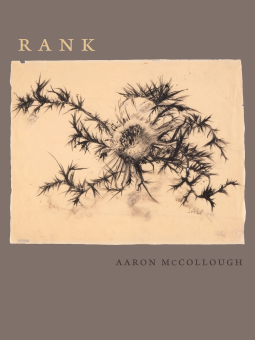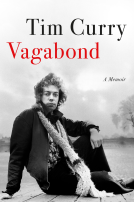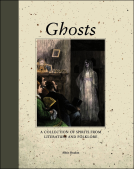
Rank
by Aaron McCollough
This title was previously available on NetGalley and is now archived.
Send NetGalley books directly to your Kindle or Kindle app
1
To read on a Kindle or Kindle app, please add kindle@netgalley.com as an approved email address to receive files in your Amazon account. Click here for step-by-step instructions.
2
Also find your Kindle email address within your Amazon account, and enter it here.
Pub Date Sep 01 2015 | Archive Date Dec 01 2015
University of Iowa Press | Kuhl House Poets
Description
In language that is dense, allusive, by turns trancelike and mordantly funny, McCollough descends into the ranks of disintegrating organic life and finds elemental processes of regeneration underway, “ivy suckers climbing / the knock kneed craning bridge / to that bright food.” This is work that emerges in the aftermath of declining systems of hierarchy and order, a site marked by the overlapping of occult practices and postmodern physics, tense meditation, and economic anonymity. McCollough gives rise to a voice that is as much vegetative as human, as deeply embedded in the loam of cultural memory as it is new, original, and lavishly daring.
Advance Praise
“Rank has dark fumes, but it’s rich as loam, with a propulsive power inside: the thorny terror that ends in a scarlet flower. McCollough’s tight verses crackle and chime—sonically rich and lexically wild—their syllables so deeply cast you can almost hear other syllables in them, worlds within worlds. Bones clacking and muscles moaning, their physicality makes meaning audible, and the pain becomes prayerful, ‘a rendition of, at least, eternity.’”—Aaron Shurin
“McCollough’s poems in Rank, as in most of his collections, come from the inner part of himself that is a cosmic being. He tunes into the cosmos and receives it, which is what being alive is: ‘I could kill for the songs, I could.’ Poetry comes from this ongoing inner state of being, between listening to the cosmos and responding to it. McCollough’s vision of eternity and our verdant patch of it is at once practical and mysterious. At some point while reading these poems, you’ll think of listening to the song ‘Nothing but Flowers’ by the Talking Heads. Strumming a guitar makes a flower bloom. The corporeal world is rank, grows over, around, above, inside, and without us. Let the universe in and change you.”— Arda Collins
Available Editions
| EDITION | Paperback |
| ISBN | 9781609383893 |
| PRICE | $19.95 (USD) |
Links
Average rating from 9 members
Featured Reviews
 Joseph S, Reviewer
Joseph S, Reviewer
Poetry of a world seen through the fog. It is more than a complete picture of what is being presented. Words give us pieces and the pieces combine to something greater than the whole. The lines of poetry in Rank work like the human eye. There are blind spots, but our brains compensate for this allowing us to see a complete uninterrupted picture. McCollough does this with his words. A quick glance at the lines and the reader misses the big picture. Time is needed for the brain to complete the image.
There are several themes running through the collections. Living inside to the outdoors are compared -- chestnut tangles outside and coffee cups on a glass table inside. Nature fights at the man-made world -- roots breaking through a wall. There is scale in the sloping shelves of the sea and the sloping shelves of the galaxy. The inside muffles our senses.
Outside the capsule of the self but not so far you're alone, guitar Listen to the fugue, a word for flower.
The fugue: the music or the loss of awareness?
McCollugh weaves together words in a near magical form. It is thinking poetry. A casual glance will not do it justice. There is a feeling of growth beyond the present, a more natural state of things. The man-made world fails in all respects except one -- the guitar. It is the beacon that connects worlds and images.
_______________________________________________________________
Aaron McCollough's books of poetry include Welkin, Double Venus, Little Ease, and No Grave Can Hold My Body Down. He was raised in Tennessee. He holds a Ph.D. in English Language and Literature from the University of Michigan as well as an MFA from the Iowa Writers' Workshop. He studies the influence of "passion" on the religious poetics of late 16th and early 17th Century England.
 Anne M, Reviewer
Anne M, Reviewer
I have this book on Kindle and although I don't much like poetry on Kindle, I'm glad in this instance as the book made good use of my automatic dictionary and word look up. Many of the words are archaic - faned, antic - and some are just beautiful... I love thalweg (a line connecting the lowest points of successive cross sections along the course of a valley or river - isn't thalweg way more poetic?).
Much of the poetry is complex and I won't pretend to have "got it" in the several readings I've done but I enjoy the language enough - especially as I learn the new words - to keep rereading.
How can you not love: -
"The woods sing out to welcome the coming judgement, a wood may go on forever."
"A terrific mass, like a star,
invisible, immeasurable,
impossibly remote,
containing every length every resource.
Time and the remainder."
Try reading the lines out loud (as I think poetry should be read but I try not to do it on the train any more) and you find the language is beautiful. There is a lot of internal rhythm and echo words and the work really needs to be read aloud in large chunks to get that rhythm and start to pick up the meaning. It isn't really separate poems but a whole piece and merits careful reading.
As I say I need to read this a few more times but it warrants the effort.
Treat yourself to a paper copy and shut yourself in a room with rain battering on a window and enjoy.
I was given a free copy of this book by Netgalley in return for an honest review.
The poetry included in this book is absolutely beautiful, though a bit complex. It felt difficult for me to grasp the whole essence of what the poet was trying to convey upon a single reading, yet further readings of this book appeal to me immensely.
I loved the imagery of the poems and the words the poet chose to employ were merely wonderful and breathtaking. The way the old was interweaved with the new, in terms of diction, and the natural world with the fantasy one was marvelous. While reading this book, images of enchanted forests and mythical places were crossing my mind.
I thoroughly enjoyed reading this poetry collection.










